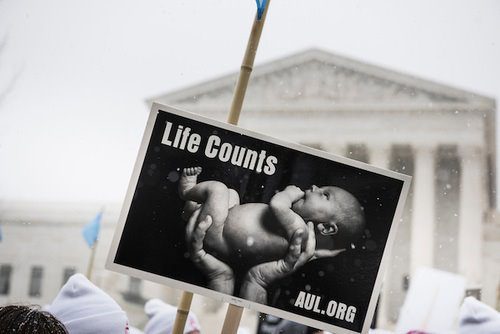Everything You Need to Know About June Medical Services v. Russo

While today we are hearing that Supreme Court oral arguments are being postponed due to Covid-19 precautions, it was only less than two weeks ago, on March 4, that we witnessed a media storm surrounding the oral arguments of the SCOTUS case, June Medical Services v. Russo, the Louisiana law related to health regulations at abortion centers. Many pro-life advocates are confused by the media messaging surrounding this case, and are struck particularly by the irony that the law is not specifically about abortion, but is rather about safety.
Long gone are the days of the pro-choice mantra “safe, legal and rare,” and the fact is, we must advocate for the health and safety of pregnant women who make an abortion decision, as well as accompany her through the process of emotional, spiritual, and physical healing afterwards. As pro-life advocates, we mourn the thousands of lives lost every day in clinics across the country, but will not stand by as abortionists profit off of unsafe, unclean, and unregulated procedures.
This law, the Unsafe Abortion Protection Act (Act 620), authored by House Rep. Katrina Jackson (D-LA), would require doctors operating out of abortion clinics in Louisiana to have hospital admitting privileges within a 30-mile radius of the facility—a standard protocol for any outpatient surgical facility.
This would mean that if something went wrong during an abortion procedure (besides the obvious, tragic loss of life of the unborn child) and the woman needed specialized attention in a hospital, she would be transferred there and treated immediately, either by the same doctor or another doctor that has been fully briefed on the details of the emergency. As noted by Dr. Christina Francis, a board-certified obstetrician-gynecologist and the chairman of the board of the American Association of Prolife OB/GYNs (AAPLOG), even the notoriously pro-abortion ACOG (American College of Obstetricians and Gynecologists) recommend a face-to-face patient handoff as best practice.
It is important to mention that Louisiana law states that all ambulatory surgical centers (anywhere you might receive an outpatient surgical procedure) are held to this standard of requiring admitting privileges—except, however, for abortion clinics. Many Louisiana lawmakers, from both sides of the aisle, are looking to close this loophole and raise the standard of care for women seeking abortions.
March for Life Education & Defense Fund is wholly against abortion at any stage and seeks to make it unthinkable at all costs. In our mission to build a culture of life, we can and must recognize that far too often a woman’s safety is jeopardized at the hands of profit-driven abortion facilities with poor standards of care. As documented in the Friend of the Court Briefing put forward by Americans United for Life, the three abortion clinics implicated in this case have over 35 health and safety violations accumulated over the last decade, with infractions including “failure to properly clean and disinfect instruments after use in patient procedures,” “failure to monitor each abortion patient’s level of consciousness, respiratory status, and cardiovascular statues during abortion procedures for patients receiving IV medications and inhalation gas agents,” and “failure to ensure qualification, training, and competency of staff administering IV medications and analgesic gases to patients,” among many others. Next time someone tells you that closing abortion clinics will result in back-alley conditions, remind them that these dangerous conditions already exist in abortion clinics across the country.
So, while asking for hospital admitting privileges may seem like the logical response to this situation, there are several secondary factors that have succeeded in splintering approval around what should be a commonly accepted law. Here are a few questions to address in order to better understand June Medical Services v. Russo:
1) What was Whole Woman’s Health v. Hellerstedt and how does it relate to June Medical Services v. Russo?
2) What is the concept of ‘undue burden,’ and does it apply here?
3) Is it a conflict of interest for an abortion clinic to represent women in a court of law?
4) What do the Supreme Court Justices think?
What was Whole Woman’s Health v. Hellerstedt and how does it relate to June Medical Services v. Russo?
In 2016, the Supreme Court took up a similar bill out of Texas, Whole Woman’s Health v. Hellerstedt, which, like June Medical Services v. Russo, would have required Texas abortion clinics to gain admitting privileges at local hospitals. This bill was ultimately denied by SCOTUS; a ruling that many pro-abortion advocates are claiming should be applied correspondingly to June Medical Services v. Russo.
Despite the talking points that these two bills are identical, there are actually a few major differences that caused the Fifth Circuit Court of Appeals to allow June Medical to move forward in Louisiana. These include a) the laws of these two states as they apply to ambulatory surgical centers, and b) the idea that women in Texas would have been subject to ‘undue burden,’ as a result of this bill, and women in Louisiana would not.
Whole Woman’s Health v. Hellerstedt would have also required all ambulatory surgical centers (ASCs) to adhere to certain structural standards for hallway width and accessibility for EMTs, a requirement that June Medical Services v. Russo does not include in its bill. This structural requirement alone was enough to close a majority of the clinics in Texas and was consequently left out of the Unsafe Abortion Protection Act.
Regarding the restriction that does apply, hospital admitting privileges, it is important to note that in Louisiana all other ASCs (anywhere where outpatient surgeries are performed) are already held to this standard, regardless of the rate at which complications actually occur during the procedure. Louisiana Attorney General, Jeff Landry, states that “this rule recognizes the higher degree of risk to patients at facilities where a high volume of surgical procedures are performed. Act 620 closed a statutory loophole by requiring abortion clinics to meet the same standards as other Louisiana Department of Health-licensed outpatient surgical facilities in the State. Texas’ law, in contrast, did not require ASC medical staff to have privileges.” So the law simply eliminates the regulatory exception that abortion clinics have been receiving for years; abortion clinics are no longer given a “pass” on health and safety but are treated as other outpatient facilities.
What is the concept of ‘undue burden’ and does it apply here?
As previously mentioned, the second major difference between Whole Woman’s Health vs. Hellerstedt and June Medical Services v. Russo is the idea of a regulation placing ‘undue burden’ on women who wish to seek an abortion; in other words, making it too difficult for her to easily access an abortion facility. This video by the Federalist Society outlines how in the Texas case, about half of the abortion clinics in question would have closed upon passing the bill, and while that would undoubtedly be a pro-life victory in and of itself, the Supreme Court deemed it unconstitutional to ask a woman to potentially drive hundreds of miles to the nearest abortion clinic. With the broad geography of Texas, this was a major concern. But, can the judges claim the same undue burden in Louisiana?
There is not enough evidence to support the idea that any of the clinics in Louisiana would be forced to close because of this law. LA Attorney General again states “The Fifth Circuit Court of Appeals found that Louisiana’s law would not force any abortion clinic closures, saying, ‘there is no evidence that any of the clinics will close as a result of the Act,’ and reiterating later that ‘the only permissible finding, under this record, is that no clinics will likely be forced to close on account of the Act.’”
Even if they did close, it would be because they fail to reach proper medical standards and should remain closed until they can comply with the standard of care of all other ASCs in the state. Four out of the six doctors implicated in this case have already had admitting privileges at some point in their careers, and it is likely they would be able to gain them again. The Federalist Society cites this in their video claiming that “if these physicians had actually used good faith efforts to obtain those admitting privileges, at most we would have one doctor that ends up having to leave one of the clinics, and that that work could be divided in such a way between the remaining doctors that, at most, the women at that clinic would experience a 50-minute delay.” The Fifth Circuit Court of Appeals revealed this in their study of the case.
Is it a conflict of interest for an abortion clinic to represent women in a court of law?
It is clear from recent polling surrounding this bill that Americans overwhelmingly believe abortion clinics should be held to the same standard of care as all other ambulatory facilities. So, why is the abortion lobby telling us otherwise? Would any woman genuinely want a lower standard of care when receiving a potentially dangerous procedure? According to these polls the answer is no. Thus, for an abortion clinic to claim to have a woman’s ‘best interest’ in mind, while actively lobbying to lower her standard of care, is a glaring irony and clear conflict of interest. How can an abortion clinic with a history of harming women accurately claim to know what is best for her?
Justice Alito asked about this topic during the oral arguments (transcript here). He questioned, “I know you think that the admitting privileges requirement serves no safety purpose, but suppose that the regulation that was being challenged was one that a lot of people might think really did serve a safety purpose…Now, if they’re wrong about that, it implicates the interests of the women who may want to get an abortion, but you would say the clinic nevertheless can sue on behalf of those women?” He later added, “The constitutional right at issue is not a constitutional right of abortion clinics, is it? It’s the right of women.” In drawing this comparison, Alito questioned the abortion lobby’s motives in this case.
Speaking of the Supreme Court Justices, what do they think?
This is the first abortion-related case taken up by SCOTUS since the recently elected Justice Brett Kavanaugh took the bench. Both he and Justice Neil Gorsuch are new to the Supreme Court since the ruling on Whole Woman’s Health v. Hellerstedt, and are seen as important allies to the pro-life argument, but the apparent conservative majority doesn’t mean much in terms of outcome predictability.
While Justice Alito asked several questions and seemed to lean towards a more conservative view of the bill, there were an equal number of questions from Justice Sonia Sotomayor and Justice Ruth Bader Ginsberg, who were vocal in working towards the opposite conclusion. It was clear that the oral arguments were not going to draw a consensus, with Justice Stephen Breyer commenting “we’re not going to solve this at oral argument.” The Supreme Court will spend the next few months reviewing the documents and will likely come to a decision to be made public in late June 2020.
While we can hope and pray for the Supreme Court to uphold this law, we can also acknowledge that June Medical Services v. Russo will set more than just a judicial precedent. Many are watching this case closely with an eye towards the question: do abortion clinics have women’s best interests in mind? Pro-life Americans know the answer to that question. It is our mission to be pro-baby and pro-woman: to defend the care and safety of every woman, to listen to the stories of those who have been hurt by their abortions and abortion experiences, and to find common ground on issues that will help to foster a culture of life in our country.
